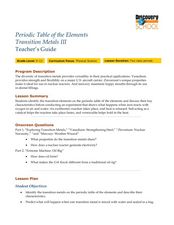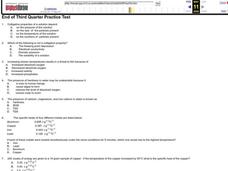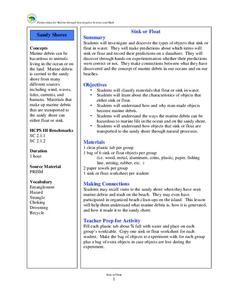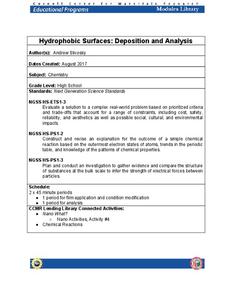Virginia Department of Education
Metals, Nonmetals, and Metalloids
How can one easily classify metals, nonmetals, and metalloids? Pupils answer this question as they experiment with unknown substances and perform tests on conductivity, brittleness, and malleability to determine...
Chemistry Teacher
Metals, Nonmetals, and Metalloids Lab
What an exciting way to introduce your blossoming chemists to the world of metals, nonmetals, metalloids, and polymers! Here is a lab activity that is designed to allow pupils the opportunity to visualize the reaction of metals,...
Curated OER
Properties of Metals
Fifth graders study the properties of metals and use them to identify different properties. In this metal properties instructional activity students complete a demonstration .
Curated OER
Transition Metals (II)
Learners discuss transition metals, their properties, and where they are located on the periodic table as well as why transition metals are ideal for coins. After discussion, they conduct an experiment using copper in the form of old...
Curated OER
Transition Metals (III)
Students discuss transition metals, where they are located on the periodic table, some of the element in the group, and some characteristics of the group. They work in groups to conduct an experiment in which they mix transition metals...
Curated OER
Sink or Float?
Have your class explore density and buoyancy using this resource. Learners read the book Who Sank the Boat, and use several items, such as rubber balls, bottle caps, wood, and other household items to conduct an experiment. Using a tub...
Curated OER
Pursuit of The Properties of Metals and Nonmetals
High schoolers examine how every element is classified based on the physical and chemical properties. In this properties of metals instructional activity students divide into groups, complete a lab and finish a data sheet.
Curated OER
Metals, Non-metals, Metalloids
Students discuss the physical and chemical properties of metals and non-metals. As a group, they classify items as a metal or non-metal. Using the periodic table chart, students discuss the characteristics of each metal. Based upon...
Curated OER
Periodic Table of the Elements: Transition Metals
Students conduct an exothermic reaction to investigate the properties of a transition metal. In this periodic table lesson, students identify the transition elements and discuss their properties after watching a video. They conduct an...
Curated OER
Solutions
In this solutions worksheet, students determine colligative properties, calculate specific heat, and review the kinetic theory as it applies to gases. This worksheet has 8 multiple choice and 9 problems to solve.
Curated OER
Periodic Table of the Elements
Students experiment with transition metals. In this transition metals lesson students find the common properties of transition metals and conduct an experiment using one of them. Students then answer questions regarding what...
Curated OER
Lead and Mercury Ion Catalase Inhibition
Students participate in a laboratory investigation in which they observe the effect of temperature and pH on enzyme activity. Students also examine exposure to heavy metal ions and the effect that may have on enzyme activity.
Alabama Learning Exchange
Float or Sink?
Experiment with mass and density as scholars figure out what makes things float or sink. First, they watch a podcast introducing these concepts. Be sure to use the comprehension question to test their understanding. Young scientists...
American Chemical Society
Solubility Test
Make sure to consult the teacher's handbook, Inquiry in Action - Investigating Matter Through Inquiry, for two demonstrations that can be done to introduce solubility and measuring crystal mass before having the class conduct this...
Curated OER
Chemical Bonding
Students classify compounds as ionic or covalent. In this chemical bonding lesson plan, students experiment with 6 chemical compounds. They test physical properties such as the melting point, the solubility and the electrical...
Virginia Department of Education
Thermochemistry: Heat and Chemical Changes
What makes particles attract? Here, learners engage in multiple activities that fully describe colligative properties and allow the ability to critically assess the importance of these properties in daily life. Young chemists...
Virginia Department of Education
Mineral Identification
What's the difference between a rock and a mineral? And what properties are used to identify minerals? The first installment of a five-part series on earth materials and processes prompts young scientists to identify a set of...
Curated OER
Testing for Conductivity
Students test the conductivity of selected liquids and solids. They test the circuit by touching the two free ends of the wires together and add salt little by little recording the data after each addition. Finally, students predict...
Curated OER
Metals, Non-Metals, Metalloids
Students describe properties of various elements. They arrange the elements based on properties in order to explain the organization of the periodic table. They label elements as metal, non-metal, or metalloid.
Curated OER
The Statistical Nature of Test Data
Young scholars investigate the properties of various metals. They conduct an experiment and gather the data by putting into the proper statistical graphs. The data is analyzed and conclusions are formed according to the properties of the...
Curated OER
Insulators
Sixth graders examine properties of four types of spoons, record observations, and apply their knowledge by designing the perfect hot chocolate cup.
Curated OER
Sink or Float
Students explore water properties by conducting a class experiment. In this buoyancy lesson, students make predictions as to whether or not specific objects will sink or float in water. Students conduct the experiment and record their...
Curated OER
Properties of Soil
Fourth graders conduct investigations to test different types of soil from different regions of Texas. They make comparisons and identify the characteristics of the soil. The end product of the inquiry is a student report.
Cornell University
Hydrophobic Surfaces—Deposition and Analysis
Couches, carpets, and even computer keyboards now advertise they are spill-resistant, but what does that mean? Scholars use physical and chemical methods to coat surfaces with thin films to test their hydrophobic properties. Then they...























